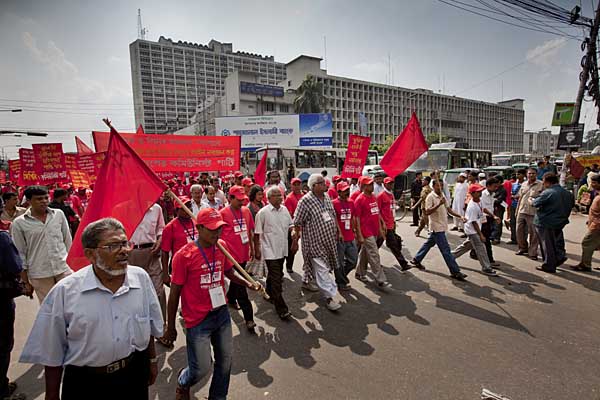Bangladesh
Who really benefits from sweatshops?

Billionaire sweatshop sponger Bruce Rockowitz's CEO in October 2011 Rockowitz married Hong Kong pop
Capitalism, sexual violence and sexism

For more discussion on feminism, click HERE
Bangladesh: Climate change and neoliberal policies

By Danielle Sabai
May 9, 2011 -- Asia Left Observer, posted at Links International Journal of Socialist Renewal with permission -- Located in the largest delta at the world, where two Himalayan rivers, the Brahmaputra and the Ganges, converge and flow into the Bay of Bengal, Bangladesh is used to climatic catastrophes. Half of the land area of Bangladesh is less than 10 metres above sea level. It consists mainly of silt deposited by the rivers that flow down from the Himalayan glaciers. When the snow melts it regularly causes large-scale floods. The coast is at the mercy of cyclones and giant waves which submerge the coastal areas.
জলবায়ু পরিবর্তন : একটি মার্ক্সবাদী বিশ্লেষণ
মূল: টেরি টাউনসেন্ড
ভাষান্তর: হাসান মেহেদী
[Original English version (2007) at http://www.dsp.org.au/node/166. The Democratic Socialist Perspective has now merged with the Socialist Alliance of Australia. This translation into Bangla appeared at Bangladesh's monthly progressive online journal, Shojashapta, on April 14, 2011.]
Global microfinance industry totters as Grameen Bank founder’s career ends in disgrace

Grameen Bank's Muhammad Yunus (right) with Bangladeshi women. The promised empowerment and poverty reduction failed to eventuate.
By Patrick Bond
April 27, 2011 -- Links International Journal of Socialist Renewal -- Bangladesh’s once-legendary banking environment is now fatally polluted. The rot is spreading so fast and far that the entire global microfinance industry is threatened. Controversy ranges far beyond poisonous local politics, the factor most often cited by those despondent about Grameen Bank’s worsening crisis.
`Development', capitalism, NGOs and people's movements in Bangladesh: an interview with Anu Muhammad

Grameen Bank and `microcredit': The `wonderful story' that never happened

Mohammad Yunus accepts the 2006 Nobel Peace Prize.
Far from being a panacea for fighting rural poverty, microcredit can impose additional burdens on the rural poor, without markedly improving their socio-economic condition, write Patrick Bond and Khorshed Alam.
October 21, 2010 -- Pambazuka News -- For years, the example of microcredit in Bangladesh has been touted as a model of how the rural poor can lift themselves out of poverty. This widely held perception was boosted in 2006 when Mohammad Yunus and Grameen Bank, the microfinance institution he set up, jointly received the Nobel Peace Prize. In South Asia in particular, and the world in general, microcredit has become a gospel of sorts, with Yunus as its prophet.
Consider this outlandish claim, made by Yunus as he got started in the late 1970s: "Poverty will be eradicated in a generation. Our children will have to go to a `poverty museum' to see what all the fuss was about."
Women dying from the Asian `miracle': System change a must to save women’s lives
By Reihana Mohideen
March 8, 2010 -- Despite the fanfare about Asia’s "miracle" economies, the problem of "missing women and girls" is actually growing, according to the United Nations Development Program-sponsored 2010 Asia-Pacific Human Development Report.
These "missing" girls and women are a result of the abortion of girl fetuses and women dying through sheer neglect – underfed and starved and not receiving adequate health care. The birth gender disparity is the highest in East Asia, home of the Asian "miracle" economies, where 119 boys are born for every 100 girls. China and India, much touted for their economic success, account for 85 million of these 100 million "missing" women.
